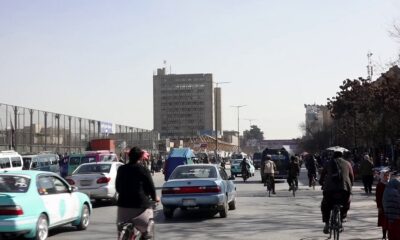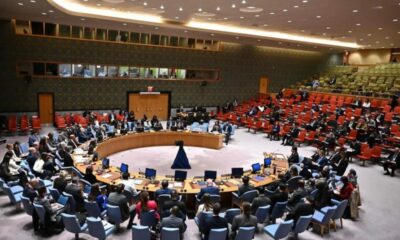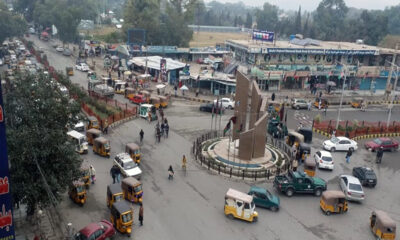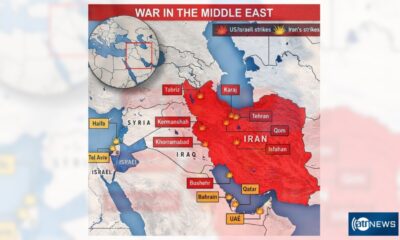COVID-19
Russia registered world’s first COVID-19 vaccine: Putin

Russian President Vladimir Putin said Tuesday that his country has succeeded to develop a vaccine that “forms stable cell and antibody immunity” against the COVID-19.
Speaking at a government meeting, Putin said: “As far as I know, this morning for the first time in the world a vaccine against the novel coronavirus infection was registered.”
The Russian Tass news agency reported that the vaccine was developed by Moscow’s Gamaleya institute and its clinical trials were over.
The vaccine was approved by the country’s Health Ministry after less than two months of human testing.
“I know this very well, because one of my daughters got vaccinated, so in this sense, she took part in testing,” Putin said. He noted that after the first vaccine shot, his daughter had a 38°C fever, and on the next day, a fever slightly higher than 37°C. And then, after the second shot, she had a slight fever again, and then everything was fine, she is feeling well and has a high [antibody] count,” Putin said quoted by the Tass.
The vaccine still has to complete final trials but Russia’s move could pave the way for mass vaccination.
Reuters reported that the vaccine’s approval by the health ministry comes before the start of a larger trial involving thousands of participants, commonly known as a Phase III trial.
Such trials, which require a certain rate of participants catching the virus to observe the vaccine’s effect, are normally considered essential precursors for a vaccine to receive regulatory approval.
The Moscow-based Association of Clinical Trials Organizations (ACTO), a trade body representing the world’s top drugmakers in Russia this week urged the health ministry to postpone approval until that final trial had been successfully completed.
In a letter to the ministry, it said there were high risks associated with registering a drug before that happened.
“It is during this phase that the main evidence of a vaccine’s efficacy is collected, as well as information on adverse reactions that could appear in certain groups of patients: people with weakened immunity, people with concomitant diseases and so forth,” it said.
Some international experts have also questioned the speed at which Russia approved its vaccine.
“Normally you need a large number of people to be tested before you approve a vaccine,” said Peter Kremsner from the University Hospital in Tuebingen, currently testing CureVac’s COVID-19 vaccine in clinical trials.
“In that respect, I think it’s reckless to do that (approve it) if lots of people haven’t already been tested.”
Duncan Matthews, a professor of intellectual property law at the Queen Mary University of London, said news of a potential COVID-19 vaccine was to be welcomed, “but safety must be the priority”.
“The U.S. Food and Drug Administration (FDA) and the European Medicines Agency (EMA) have fast-track approval procedures for emergency humanitarian use and we need to see evidence that Russia is adopting an equally prudent approach,” Matthews said in an emailed comment.
More than 100 possible vaccines are being developed around the world to try to stop the COVID-19 pandemic. At least four are in final Phase III human trials, according to WHO data.
(With inputs from Reuters)
COVID-19
WHO declares end to COVID global health emergency

The World Health Organization said Friday that COVID-19 no longer qualifies as a global emergency, marking a symbolic end to the devastating coronavirus pandemic that triggered once-unthinkable lockdowns, upended economies and killed millions of people worldwide.
The announcement, made more than three years after WHO declared the coronavirus an international crisis, offers some relief, if not an ending, to a pandemic that stirred fear and suspicion, hand-wringing and finger-pointing across the globe, AP reported.
The U.N. health agency’s officials said that even though the emergency phase was over, the pandemic hasn’t finished, noting recent spikes in cases in Southeast Asia and the Middle East.
WHO says thousands of people are still dying from the virus every week, and millions of others are suffering from debilitating, long-term effects.
“It’s with great hope that I declare COVID-19 over as a global health emergency,” WHO Director-General Tedros Adhanom Ghebreyesus said.
“That does not mean COVID-19 is over as a global health threat,” he said, warning that new variants could yet emerge. Tedros noted that while the official COVID-19 death toll was 7 million, the real figure was estimated to be at least 20 million.
Tedros said the pandemic had been on a downward trend for more than a year, acknowledging that most countries have already returned to life before COVID-19.
He bemoaned the damage that COVID-19 had done to the global community, saying the pandemic had shattered businesses, exacerbated political divisions, led to the spread of misinformation and plunged millions into poverty.
When the U.N. health agency first declared the coronavirus to be an international crisis on Jan. 30, 2020, it hadn’t yet been named COVID-19 and there were no major outbreaks beyond China.
More than three years later, the virus has caused an estimated 764 million cases globally and about 5 billion people have received at least one dose of vaccine.
In the U.S., the public health emergency declaration made regarding COVID-19 is set to expire on May 11, when wide-ranging measures to support the pandemic response, including vaccine mandates, will end. Many other countries, including Germany, France and Britain, dropped most of their provisions against the pandemic last year.
When Tedros declared COVID-19 to be an emergency in 2020, he said his greatest fear was the virus’ potential to spread in countries with weak health systems.
Most recently, WHO has struggled to investigate the origins of the coronavirus, a challenging scientific endeavor that has also become politically fraught.
COVID-19
COVID-19 in Iran: Nearly 900 new cases, 24 deaths recorded

The Iranian health ministry announced on Sunday that more than 890 new cases of COVID-19 have been identified across the country during the past 24 hours, adding that 24 patients have died in the same period of time, Fars News Agency reported.
“A sum of 891 new patients infected with COVID-19 have been identified in the country based on confirmed diagnosis criteria during the past 24 hours,” the Iranian Health Ministry’s Public Relations Center said on Sunday, adding, “454 patients have been hospitalized during the same time span.”
The ministry’s public relations center said 611 people infected with COVID-19 are in critical condition.
COVID-19
China says 200 million treated, pandemic ‘decisively’ beaten

China says more than 200 million of its citizens have been diagnosed and treated for COVID-19 since it lifted strict containment measures beginning in November.
With 800,000 of the most critically ill patients having recovered, China has “decisively beaten” the pandemic, according to notes from a meeting of the ruling Communist Party’s all-powerful Politburo Standing Committee presided over by President and party leader Xi Jinping, AP reported.
China enforced some of the world’s most draconian lockdowns, quarantines and travel restrictions and still faces questions about the origins of the virus that was first detected in the central Chinese city of Wuhan in late 2019. Heavy-handed enforcement prompted rare anti-government protests and took a heavy toll on the world’s second-largest economy.
The official Xinhua News Agency quoted Xi as saying that policies to control the outbreak had been “entirely correct.” The abrupt lifting in November and December of the “zero COVID” policy that had sought to eliminate all cases of the virus led to a surge in infections that temporarily overwhelmed hospitals.
Case numbers have since peaked and life has largely returned to normal, although international travel in and out of China has yet to return to pre-pandemic levels.
China is now transitioning to a post-pandemic stage after a fight against the outbreak that was “extraordinary in the extreme,” Xinhua said.
The government will continue to “optimize and adjust prevention and control policies and measures according to the times and situations with a strong historical responsibility and strong strategic determination,” Xinhua said.
-
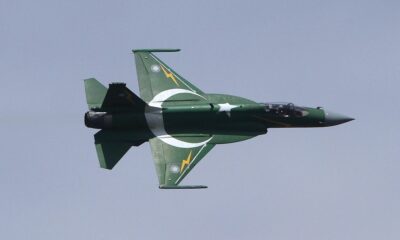
 Latest News2 days ago
Latest News2 days agoPakistani military jet downed in Afghanistan’s Jalalabad, pilot captured alive
-

 Latest News2 days ago
Latest News2 days agoAfghan Air Force conducts airstrikes in Islamabad, other cities
-
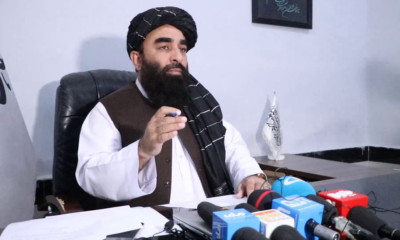
 Latest News2 days ago
Latest News2 days agoIEA: Special circle in Pakistan has launched mission to destabilize region
-

 World4 days ago
World4 days agoIndia’s Modi backs Israel in address at Israeli parliament
-
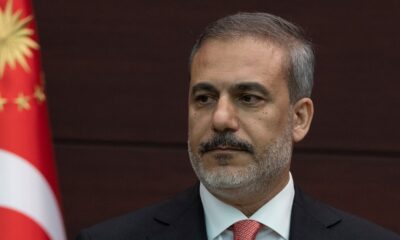
 Latest News2 days ago
Latest News2 days agoTurkey launches initiative to diffuse Afghanistan-Pakistan tension
-

 Regional3 days ago
Regional3 days agoNarendra Modi holds high-level talks after historic address to Knesset
-

 Latest News2 days ago
Latest News2 days agoAfghans say they are united against Pakistan aggression
-

 Latest News3 days ago
Latest News3 days agoPakistan carries out airstrikes after Afghanistan launches retaliatory attacks




